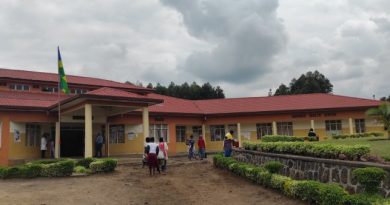Clean water remains a dream for residents in Ndego sector
The sector of Ndego in Kayonza District, the eastern part of Rwanda which used to be part of Akagera national park before it was populated in 1995, has always encountered clean water issues. Recently, residents have been requesting their leaders’ intervention without results, and are accusing local leaders of failing to keep their promises.
A young man, Vedaste Nayigiziki, says that clean water issues impact the wellbeing of all generations, from parents to little kids.
“If you are a student at Ndego secondary school, you still need to fetch this water before you go to school, it’s this water that will be used to cook, to drink and even to wash; but whenever you use this water to bath, your skin looks whitened.” He said.
To get the water from the swamp, residents have to pull up their clothes: the swamp looks dry but there is water underneath. “When it’s raining you can get that water easily, but when the dry season comes, and because the livestock drink it too it dries off; to get that dirty water you need a lot of effort to get where it is.” A resident said.

During the rainy season they try to collect rain water, but their tanks are already dry and when the water gets in it break out. The water they get from the swamp contains worms that can even be seen moving, Yafashije said.
The residents affirm that the lack of clean water causes sicknesses like intestinal worms; what they fetch is not actually water, they say. They don’t have water despite being surrounded by lakes.
The long distance to the clean water
Cecile Nyirandora, another resident, says that in order to get drinkable water, locals have to walk between three and four hours or ride an hour on a bicycle. Otherwise they have to buy it from those who have bicycles at a cost of Rwf 300 for one gallon.
After that long route to get where the drinkable water is, they still have to pay Rwf 50 per gallon.
The risk of drop out
The kids who have to fetch water before school, risk dropping out or staying behind in classes.
“I send my child to fetch water early morning, and when she gets home she is already late for school,” said one local parent. “The next day I have to go to work for someone in order to get food and that child will stay home looking after her young siblings, if it happens like three times a week it’s like dropping out; she will never be on the same line as her classmates.”
The consequences on women and children
While some can use their bicycles to fetch clean water without their children missing classes, women, including the old and weak, often have to fetch the dirty water that puts their lives and that of their children at risk of sicknesses, and missing schools sometimes.

A joint report by the WHO and UNICEF, from November 2021, shows that only 57% of the Rwanda population has access to safe drinking water within 30 minutes of their homes. This is an issue especially for girls who are often expected to take on the majority of household tasks.
Even if water is nearby home, it’s often not safe to drink for children; they risk severe illness from water-borne diseases.
What the administration says about the issue
The executive secretary of Ndego sector, Claude Bizimana, says that the long-lasting issue of clean water could soon be solved with the help of Water and Sanitation Corporation (WASAC) by the advocacy of Kayonza district.
However, the mayor of Kayonza District John Bosco Nyemazi says this could take some time, because the water treatment plant project is among the biggest they plan to implement in partnership with other stakeholders.
Since 1995, every leader of Ndego has promised clean water to these residents. For now, they remain only promises.




